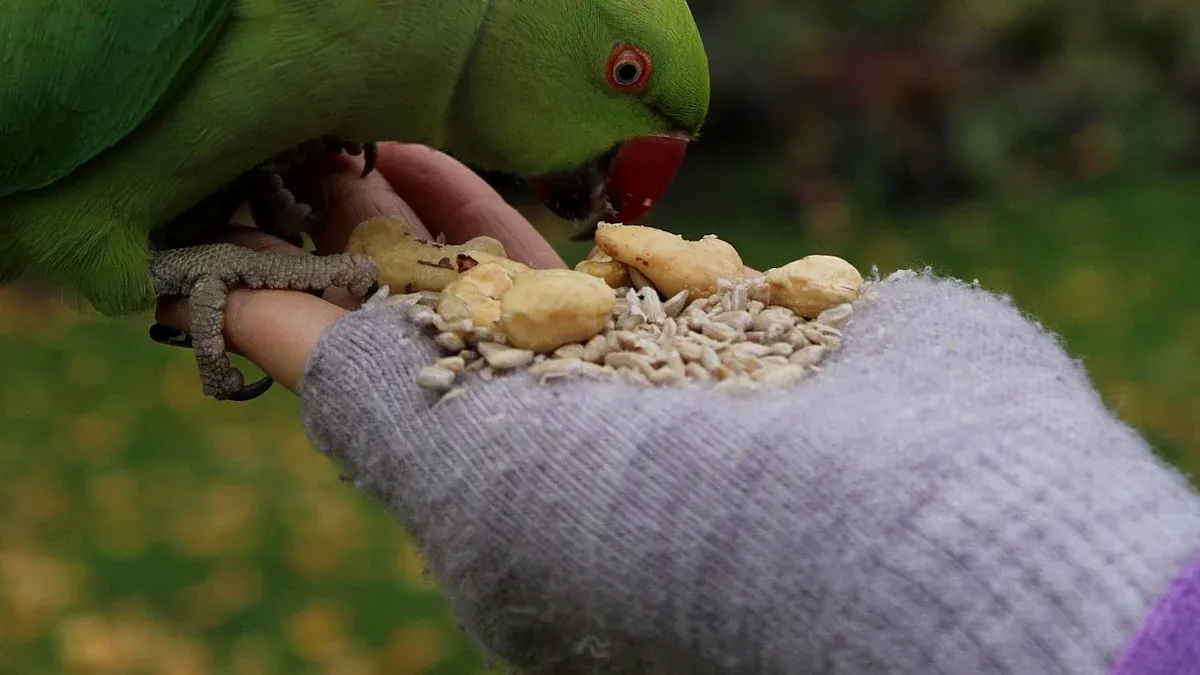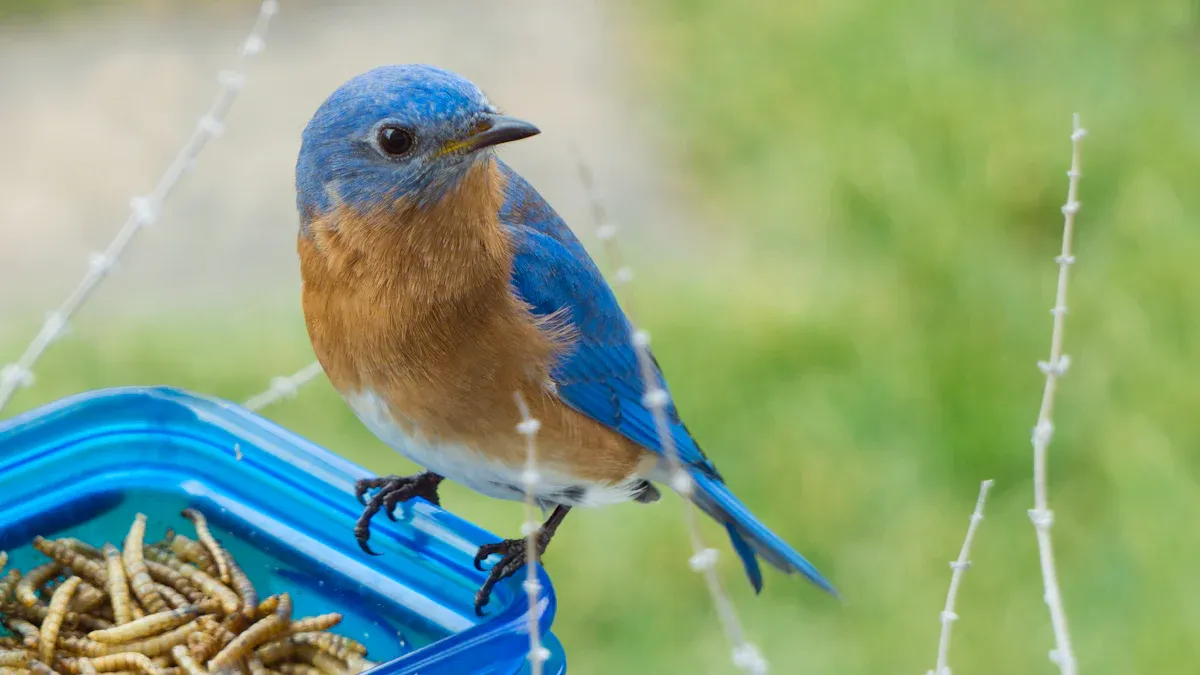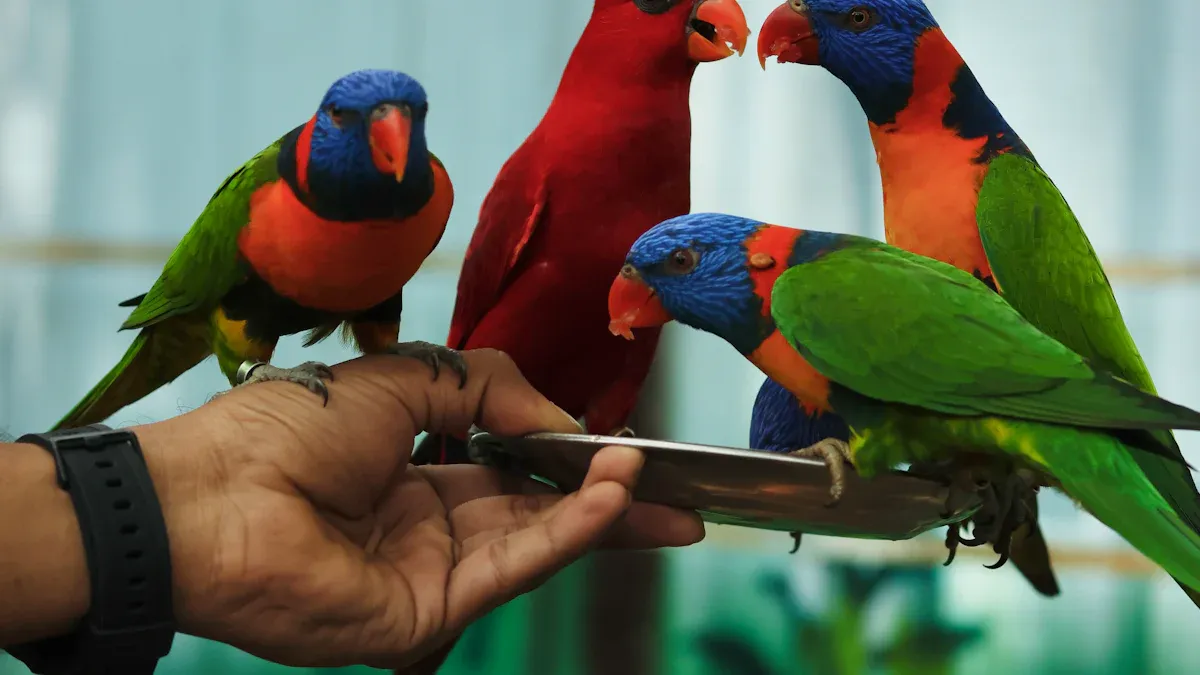
Mealworms for Parrot Diets offer a natural boost of protein, healthy fats, and essential nutrients. These tiny treats help parrots stay energetic and support beautiful feathers. Many bird owners choose mealworms because they see real improvements in their pets. Parrots enjoy the taste and benefit from better health.
Key Takeaways
- Mealworms provide parrots with high protein, healthy fats, and essential vitamins that support strong muscles, shiny feathers, and overall energy.
- Feed mealworms in moderation, offering 2-4 worms two or three times a week, to keep your parrot healthy and prevent overfeeding.
- Choose mealworms from trusted sources and prepare them properly to avoid health risks and keep your parrot safe.
Mealworms for Parrot Diets: Nutritional Value and Key Benefits

Protein, Healthy Fats, and Essential Nutrients
Mealworms for Parrot Diets deliver a powerful combination of protein, healthy fats, and essential nutrients. Scientific studies show that mealworms offer balanced protein and all ten essential amino acids needed by parrots. These amino acids, such as lysine, methionine, and tryptophan, help parrots build strong muscles, repair tissues, and maintain healthy feathers. The protein content in dried mealworms can reach up to 53%, which matches or even exceeds the protein found in chicken or turkey.
Mealworms also provide a rich source of healthy fats, with crude fat content ranging from 27% to 50%. These fats give parrots the energy they need for daily activities and support their active metabolism. The fats in mealworms, combined with protein, help parrots maintain healthy skin and a glossy coat. This makes mealworms a smart choice for owners who want to boost their bird’s vitality and stamina.
Tip: Choose mealworms from reputable suppliers to ensure quality and safety for your parrot.
Mealworms for Parrot Diets also supply important vitamins and minerals. They contain B vitamins, especially B2 and B12, which help with energy metabolism and keep parrots active. Minerals like iron, calcium, magnesium, and zinc support immune function and bone health. The table below highlights some of the key nutrients and their benefits:
| Nutrient | Benefit for Parrots |
|---|---|
| Vitamin B12 | Supports nerve and blood health, immune system |
| Iron | Crucial for oxygen transport and blood flow |
| Zinc | Aids immune support |
| Healthy Fats | Provide energy, contribute to feather shine and skin health |
Supporting Feather Health and Vibrant Plumage
Mealworms for Parrot Diets play a vital role in feather health and vibrant plumage. The protein and amino acids in mealworms support feather growth and structure, making feathers stronger and more resilient. Vitamins, especially B12, enhance nerve health and contribute to brighter feather colors. Minerals like zinc, copper, magnesium, and manganese are important for shiny feathers and overall feather quality.
| Nutrient Category | Contribution to Feather Vibrancy and Coloration |
|---|---|
| Protein and Amino Acids | Support feather growth and structure, essential for strong feathers |
| Vitamins (especially B12) | Enhance energy, nerve health, and contribute to brighter feather colors |
| Minerals (zinc, copper, magnesium, manganese) | Important for shiny feathers and overall feather quality |
| Healthy Fats (including omega fatty acids) | Provide energy and support molting, leading to faster regrowth of vibrant feathers |
These nutrients help parrots molt efficiently and develop fuller, shinier, and more colorful feathers. Owners often notice their birds looking healthier and more vibrant after adding mealworms to their diet.
Boosting Energy, Immunity, and Cognitive Function
Mealworms for Parrot Diets give parrots a natural energy boost. The high fat content provides quick energy, supporting an active lifestyle. B vitamins, such as B2 and B12, help with energy metabolism, keeping parrots lively and alert. Iron and zinc strengthen the immune system, helping birds fight off illness.
The complete amino acid profile in mealworms supports brain health and cognitive function. Parrots need these nutrients to stay sharp and engaged. Healthy fats also play a role in brain development and function, making mealworms a smart addition for parrots of all ages.
Note: Mealworms for Parrot Diets should be used as a supplement, not a primary food source, to ensure a balanced diet.
Mealworms for Parrot Diets offer a unique blend of nutrients that support every aspect of a parrot’s health. Owners who want to see their birds thrive should consider adding mealworms as a regular treat.
Mealworms for Parrot Diets: Safe Feeding Practices and Considerations

Portion Size, Frequency, and Moderation
Parrot owners want their birds to thrive. Portion control plays a key role in keeping parrots healthy. Experts recommend that mealworms make up less than 6% of a parrot’s total diet. Most parrots do best with 2-4 mealworms, offered two or three times per week. This schedule prevents overfeeding and helps maintain a balanced diet. Owners should adjust portion sizes based on the parrot’s size, age, and activity level.
Signs of overfeeding include lethargy, weight gain, and puffed feathers. Parrots may also show reduced activity or have trouble moving. Owners should monitor their bird’s weight and health regularly. Mealworms for Parrot Diets work best as a supplement, not a replacement for pellets, seeds, fruits, and vegetables.
Tip: Use mealworms as a special treat. This keeps your parrot excited and prevents nutritional imbalances.
Choosing Live, Freeze-Dried, or Soaked Mealworms
Parrots enjoy variety. Owners can choose from live, freeze-dried, or soaked mealworms. Each type offers unique benefits:
| Type | Benefits | Considerations |
|---|---|---|
| Live | Stimulates natural foraging instincts; high palatability | Requires careful handling and hygiene |
| Freeze-Dried | Convenient; long shelf life; easy to store | May need soaking for easier digestion |
| Soaked | Soft texture; easier for young or older parrots | Must use clean, fresh water |
Live mealworms encourage natural behaviors. Freeze-dried mealworms offer convenience and reduce the risk of parasites. Soaked mealworms suit parrots with sensitive beaks or those new to this food. Owners should always select high-quality products from trusted sources. Mealworms for Parrot Diets from reputable brands ensure safety and nutrition.
To introduce mealworms, start slowly. Mix a small amount with the parrot’s usual food. Hide mealworms in foraging toys to make feeding fun and engaging. Monitor the bird’s reaction and adjust as needed.
Potential Risks and How to Avoid Them
Mealworms can carry bacteria such as Salmonella and E. coli if not handled properly. Parasites like Gregarine spp., Hymenolepis diminuta, and mites may also pose risks. Owners can protect their parrots by following these steps:
- Blanch, freeze, or dry mealworms to reduce bacteria and parasites.
- Store mealworms in airtight containers to prevent contamination.
- Clean feeders and cages regularly with warm soapy water and a diluted bleach solution.
- Avoid feeding mealworms that show signs of mold or spoilage.
- Choose mealworms raised in clean environments and free from antibiotics or contaminated feed.
Alert: Never feed raw or spoiled mealworms. Proper preparation and storage keep your parrot safe.
Regular health checks help catch problems early. If a parrot shows signs of illness after eating mealworms, consult an avian veterinarian. Owners who follow these guidelines can safely enjoy the benefits of mealworms for their birds.
Parrots thrive when owners offer a balanced diet. Mealworms provide concentrated protein, support feather regrowth, and help birds stay strong. Adding gutloaded mealworms boosts calcium and vitamins. Owners should focus on variety, portion control, and regular vet checkups to keep parrots healthy and energetic.
- Mealworms supply nearly 50% protein, aiding molting and strength.
- Gutloading mealworms increases calcium and vitamin intake.
- Dietary variety ensures long-term health and vibrant plumage.
Owners should consult an avian veterinarian if they notice changes in their parrot’s health.
FAQ
Can all parrot species eat mealworms?
Most parrot species can enjoy mealworms as a treat. Owners should check with an avian veterinarian before adding new foods to their bird’s diet.
How should owners introduce mealworms to a parrot’s diet?
Start with a small amount. Mix mealworms with regular food. Watch the parrot’s reaction. Gradually increase the portion if the bird enjoys them.
Are freeze-dried mealworms as nutritious as live ones?
Freeze-dried mealworms keep most nutrients. They offer convenience and safety. Many owners choose freeze-dried mealworms for easy storage and reliable quality.
Tip: Always choose high-quality mealworms from trusted brands for the best results.


